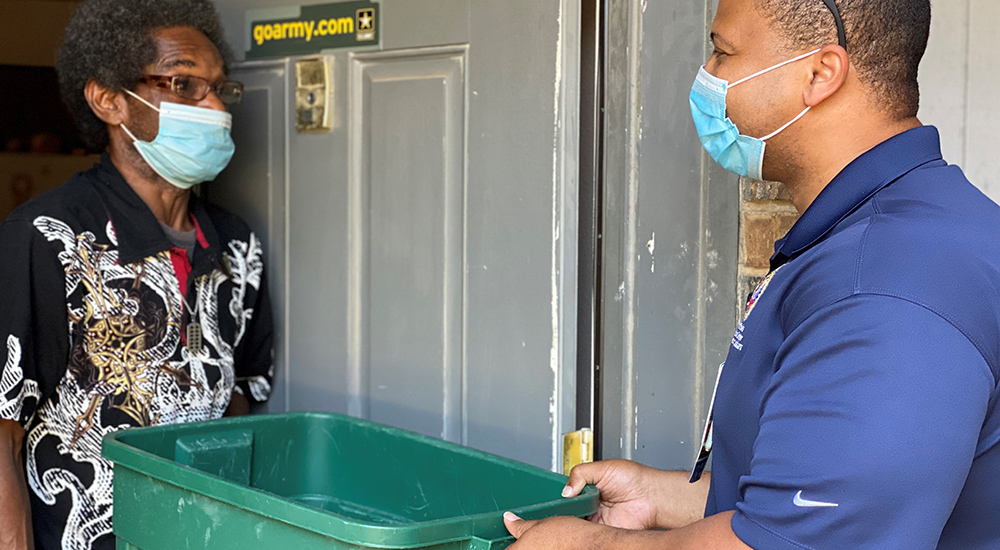The Healthcare for Homeless Veterans (HCHV) Program at the Overton Brooks VA Medical Center in Shreveport provides more than housing and shelter to Veterans experiencing homelessness or who are at risk of homelessness.

Peer Support Specialist Mike Smith packs groceries for delivery in the Shreveport-Bossier City area.
The people working in the HCHV Program understand that hardship comes in many forms. Due to low income or loss of employment, many eligible Veterans, especially right now, cannot afford what most of us take for granted — food.
“We do everything in our power to make sure our Veterans are safe. Our team makes sure that our Veterans don’t have to go without,” said Peer Support Specialist Mike Smith. “All our Veterans are low income, and many have families. The last thing we want is for any Veteran or their family to be hungry.”
In the photo above, Smith retrieves a plastic container from Clinton Beckton, an Army Veteran who has benefited from the HCHV Program.
Putting food on the table is difficult
The job market has been impacted, further devastating Veteran households already experiencing financial hardships. This means putting food on the table is even more difficult.
VA employees have developed and used creative methods, like telehealth and drive-through pharmacies, to continue providing high-quality health care. HCHV staff have stepped up as well.
Peer Support Specialist James Owens, Jr., said, “Our Veterans’ battles with food insecurity is a normal situation. We want to ensure they continue to receive the help they need.”

Mike Smith reviews a list of food items with Carolyn Green. Green manages food distribution at the Freedom Church Food Bank in Bossier City, Louisiana.
HCHV staff regularly visit a local food bank and then deliver food directly to Veterans.
“There are times when I need a little more help, and VA’s Homeless Veterans program has been a big help,” said Clinton Beckton, a U.S. Army Veteran who served from 1976 to 1982. “My food situation is difficult. We should all be very grateful to have this help.”
Since April, HCHV has made more than 60 deliveries of food and supplies from the food bank and another 30-plus deliveries from the small HCHV food pantry stocked by community and VA employee donations.
Support
Once enrolled in the HCHV program, Veterans are assigned peer support or a social worker, who maintains regular contact to check on housing, food and other needs. As for a safe delivery, when HCHV staff arrive at a Veteran’s location, food and supplies are placed in a plastic container. The Veteran retrieves the container and transfers the items into their home. The container is then retrieved and sanitized.
“We are always there to provide for the Veteran and household,” Smith said. “We do distribute based on what’s available. Most of the time, we deliver some type of meat, can goods, sometimes fresh vegetables, eggs, butter, bread items, pastries, cakes, pies and even ice cream, on occasion.”
The team uses these deliveries to engage and have in-person conversations with Veterans. These interactions help staff identify other needs, such as mental health, occupational health, peer support or primary care.
“We make it a point to connect with our Veterans by asking them about any other needs, making jokes and just checking on their overall well-being,” smiled Owens. “These deliveries are a way to have additional personal interaction with them.”
The Shreveport VA currently cares for more than 300 Veterans who have experienced homelessness at one time or another. HCHV maintains frequent communication with all. However, there are presently 170 Veterans under active case management.
Shannon Arledge is a public affairs officer for the Overton Brooks VA Medical Center.
Topics in this story
More Stories
The Medical Foster Home program offers Veterans an alternative to nursing homes.
Watch the Under Secretary for Health and a panel of experts discuss VA Health Connect tele-emergency care.
The 2024 National Veteran Suicide Prevention Annual Report provides the foundation for VA’s suicide prevention programs and initiatives.






